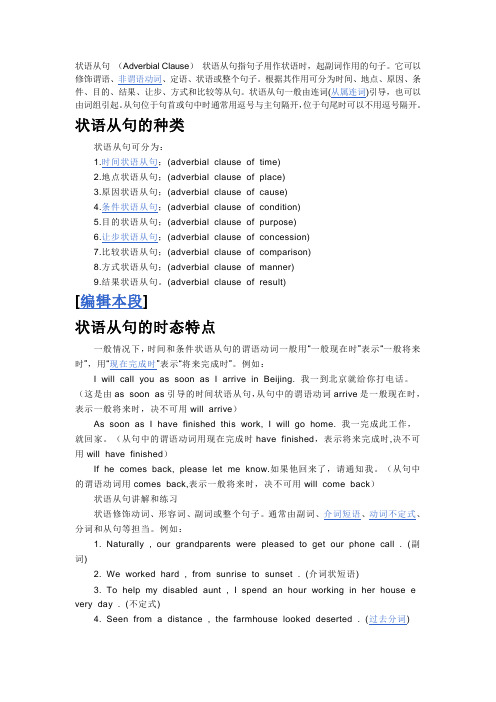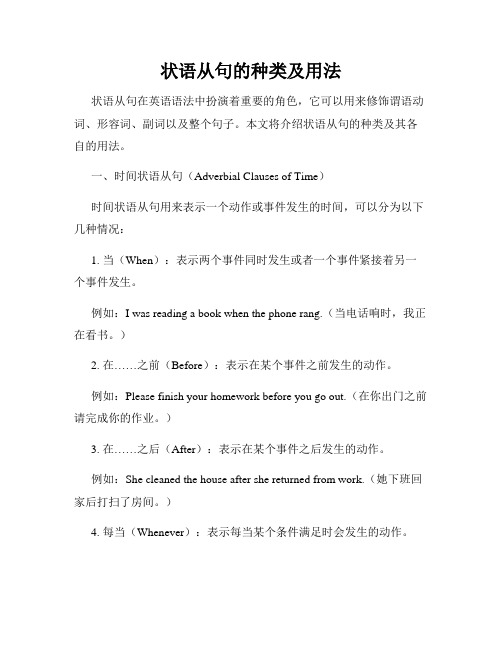状语从句在语法填空及写作中的运用
状语从句在句子中的位置和作用

状语从句在句子中的位置和作用状语从句是复合句的一种,用来修饰主句中的动词、形容词、副词等。
它在句子中的位置和作用起着至关重要的作用。
本文将探讨状语从句在句子中的位置和作用,并分析其在句子中的各种用法。
1. 状语从句的位置状语从句可以出现在句首、句中或句末的位置。
具体位置的选择取决于状语从句与主句之间的逻辑关系以及表达的语义重点。
若状语从句起补充说明或阐述的作用,通常放在主句之后,如:例1:Although he was tired, he managed to finish the project.中文:尽管他很累,他还是完成了这个项目。
若状语从句用来表示原因、条件或目的等,通常放在主句之前,如:例2:If you study hard, you will pass the exam.中文:如果你努力学习,你将会通过考试。
若状语从句起补充说明并强调程度的作用,通常放在主句之中,如:例3:I will help you whenever you need assistance.中文:无论什么时候你需要帮助,我都会帮助你。
2. 状语从句的作用状语从句可以起到多种作用,根据在句子中的位置和所表达的内容不同,可以分为时间、地点、原因、条件、目的、方式、让步等几种作用。
2.1 时间状语从句可以表示主句中动作发生的时间,常用的引导词有when, while, as, before, after等,如:例4:I always go to the gym when I finish work.中文:我下班后经常去健身房。
2.2 地点状语从句可以表示主句中动作发生的地点,常用的引导词有where, wherever等,如:例5:He can work wherever he wants.中文:无论他在哪里,他都可以工作。
2.3 原因状语从句可以表示主句中动作发生的原因,常用的引导词有because, since, as等,如:例6:He didn't pass the exam because he didn't study enough.中文:他没有通过考试是因为他没有足够地学习。
英语中状语从句用法及例句总结(完整)

状语从句(Adverbial Clause)状语从句指句子用作状语时,起副词作用的句子。
它可以修饰谓语、非谓语动词、定语、状语或整个句子。
根据其作用可分为时间、地点、原因、条件、目的、结果、让步、方式和比较等从句。
状语从句一般由连词(从属连词)引导,也可以由词组引起。
从句位于句首或句中时通常用逗号与主句隔开,位于句尾时可以不用逗号隔开。
状语从句的种类状语从句可分为:1.时间状语从句;(adverbial clause of time)2.地点状语从句;(adverbial clause of place)3.原因状语从句;(adverbial clause of cause)4.条件状语从句;(adverbial clause of condition)5.目的状语从句;(adverbial clause of purpose)6.让步状语从句;(adverbial clause of concession)7.比较状语从句;(adverbial clause of comparison)8.方式状语从句;(adverbial clause of manner)9.结果状语从句。
(adverbial clause of result)[编辑本段]状语从句的时态特点一般情况下,时间和条件状语从句的谓语动词一般用“一般现在时”表示“一般将来时”,用“现在完成时”表示“将来完成时”。
例如:I will call you as soon as I arrive in Beijing. 我一到北京就给你打电话。
(这是由as soon as引导的时间状语从句,从句中的谓语动词arrive是一般现在时,表示一般将来时,决不可用will arrive)As soon as I have finished this work, I will go home. 我一完成此工作,就回家。
(从句中的谓语动词用现在完成时have finished,表示将来完成时,决不可用will have finished)If he comes back, please let me know.如果他回来了,请通知我。
状语从句的种类及用法

状语从句的种类及用法状语从句在英语语法中扮演着重要的角色,它可以用来修饰谓语动词、形容词、副词以及整个句子。
本文将介绍状语从句的种类及其各自的用法。
一、时间状语从句(Adverbial Clauses of Time)时间状语从句用来表示一个动作或事件发生的时间,可以分为以下几种情况:1. 当(When):表示两个事件同时发生或者一个事件紧接着另一个事件发生。
例如:I was reading a book when the phone rang.(当电话响时,我正在看书。
)2. 在……之前(Before):表示在某个事件之前发生的动作。
例如:Please finish your homework before you go out.(在你出门之前请完成你的作业。
)3. 在……之后(After):表示在某个事件之后发生的动作。
例如:She cleaned the house after she returned from work.(她下班回家后打扫了房间。
)4. 每当(Whenever):表示每当某个条件满足时会发生的动作。
例如:Whenever I feel sad, I listen to music.(每当我感到伤心时,我会听音乐。
)二、地点状语从句(Adverbial Clauses of Place)地点状语从句用来表示一个动作或事件发生的地点,以下是其中几种情况:1. 哪里(Where):表示某个事件发生的地点。
例如:I will meet you where we had our first date.(我会在我们初次约会的地方见你。
)2. 无论……哪里(Wherever):表示不论在哪里发生的动作。
例如:Wherever you go, I'll go.(无论你去哪里,我都会去。
)三、原因状语从句(Adverbial Clauses of Reason)原因状语从句用来表示一个动作或事件发生的原因,以下是其中几种情况:1. 因为(Because):表示由于某个原因而发生的动作。
状语从句在句子中的位置和作用对句子的修饰和语气的表达具有重要意义

状语从句在句子中的位置和作用对句子的修饰和语气的表达具有重要意义状语从句是指在句子中起状语作用的从句。
它可以表示时间、地点、原因、条件、目的等不同的语义关系,通过修饰句子的主要部分,使句子更加丰富和准确。
状语从句在句子中的位置和作用对句子的修饰和语气的表达具有重要意义。
下面将从不同的角度探讨状语从句在句子中的位置和作用。
一、状语从句对句子的修饰作用状语从句可以对句子中的动作、行为、情况等进行修饰,使句子更加具体、清晰和生动。
比如:1. 时间状语从句时间状语从句常常出现在主句之前或之后,用以表示动作发生的时间。
例如:"当我正在学习时,电话突然响了。
"这个例句中,“当我正在学习时”是一个时间状语从句,修饰主句中的动作“电话突然响了”,表明这个动作发生的时间。
2. 地点状语从句地点状语从句用于修饰句子中的行为发生的地点。
例如:"无论我们走到哪里,我们的家乡永远在心中。
"这个例句中,“无论我们走到哪里”是一个地点状语从句,修饰主句中的行为“我们的家乡在心中”,表明无论身在何处,家乡都在心中。
3. 原因状语从句原因状语从句通常用来表示主句中某个动作或状态的原因。
例如:"因为他又犯了同样的错误,所以他受到了惩罚。
"这个例句中,“因为他又犯了同样的错误”是一个原因状语从句,修饰主句中的结果“他受到了惩罚”,说明造成这个结果的原因。
二、状语从句对句子的语气表达作用状语从句可以通过改变句子的语气,使句子更加感情化或者客观化。
它可以表达说话者的态度、观点或者根据客观事实进行陈述。
比如:1. 条件状语从句条件状语从句用来表示某种条件下会发生的动作或事件。
例如:"如果你努力学习,你一定会成功。
"这个例句中,“如果你努力学习”是一个条件状语从句,表达主句“你一定会成功”的条件,以此表达说话者对学习努力的期望和鼓励。
2. 目的状语从句目的状语从句用来表示某个动作或行为的目的或者意图。
状语从句的用法归纳总结及用法

状语从句的用法归纳总结及用法状语从句是复合句中的一种主从结构,用于修饰、说明主句中的动词、形容词、副词等成分。
它起到补充、限制和修饰主句的作用,使得整个句子更加准确丰富。
在英语写作中,灵活运用状语从句能够提高表达的准确性和语言的流畅度。
本文将对状语从句进行归纳总结,并详细介绍其常见的使用方式。
一、时间状语从句时间状语从句是指修饰主句谓语动词发生时间或时间段的从句。
以下是几种常见的时间状语从句:1. 当/当…时(When)这是表示某个事件或行为发生时机的常见引导词,如:- When I was a child, I used to play in the park.- I will give you a call when I arrive at the airport.2. 每当…就(Whenever)这种类型的时间状语从句指动作在不同时刻重复出现,如:- Whenever it rains, my dog hides under the bed.- The children always get excited whenever they see ice cream.3. 只要…就(As long as)这类状语从句表达的是条件和结果,如:- You can borrow my car as long as you promise to return it before midnight.- As long as you work hard, you will succeed.4. 一…就(Once)这种类型的状语从句表示的是某件事情发生的时候立刻做出反应,如:- Once you finish your homework, you can go out and play.- Once the sun sets, darkness falls quickly.二、地点状语从句地点状语从句修饰主句中动词的地点或方向。
状语从句的作用

状语从句的作用状语从句是指在句子中充当状语的从句。
它通过描述时间、原因、目的、条件、方式等方式,来修饰主句或整个句子,使句子的意思更加丰富和具体。
状语从句在语法上起到了非常重要的作用,下面将介绍其主要的作用和用法:1. 表示时间状语从句可以用来表示时间的先后顺序和时间关系。
例如:- When I arrived at the party, everyone had already left.(当我到达派对时,每个人已经离开了。
)- After he finishes his work, he will go to the gym.(在他完成工作之后,他将去健身房。
)2. 表示原因状语从句可以用来说明某件事情发生的原因或理由。
例如:- Because she was sick, she couldn't attend the meeting.(因为她生病了,所以她不能参加会议。
)- Since it's raining outside, we should bring umbrellas.(因为外面正在下雨,所以我们应该带上雨伞。
)3. 表示目的状语从句可以用来表达某个行为或动作的目的或意图。
例如:- I am studying hard so that I can pass the exam.(我正在努力研究,以便能够通过考试。
)- He works extra hours in order to save money for his vacation.(他加班赚钱是为了为他的假期存钱。
)4. 表示条件状语从句可以用来表示某个条件下可能发生的情况。
例如:- If it rains tomorrow, we will stay indoors.(如果明天下雨,我们将呆在室内。
)- Unless she apologizes, I won't forgive her.(除非她道歉,否则我不会原谅她。
高考作文状语从句使用巧妙运用状语从句才能增加句子的表达能力
高考作文状语从句使用巧妙运用状语从句才能增加句子的表达能力高考作文状语从句的巧妙运用高考作文是考生展示语言表达能力和思维深度的重要环节。
作为一种重要的修辞手法,状语从句在句子中具有极大的表达能力。
巧妙地运用状语从句,可以使句子更加丰富多样,增加句子的表达能力。
下面将以高考作文为背景,详细探讨状语从句的运用。
一、状语从句的定义和作用状语从句是一个由从属连词引导的从句,修饰主句中的动词、形容词、副词或整个句子,在整个句子中起到状语的作用。
状语从句可以用来表示时间、条件、原因、目的、方式、让步等等。
二、状语从句的几种常见类型1. 时间状语从句时间状语从句用来表示一个动作或事件发生的时间。
例如:- As soon as he arrived home, it started to rain.(他一到家,天就开始下雨。
)- After I finish my homework, I will go for a walk.(我做完作业后,我会去散步。
)2. 条件状语从句条件状语从句用来表示主句的动作或状态发生的条件。
例如:- If you study hard, you will pass the exam.(如果你努力学习,你会通过考试。
)- Unless you apologize, I won't forgive you.(除非你道歉,否则我不会原谅你。
)3. 原因状语从句原因状语从句用来表示主句的动作或状态的原因。
例如:- Since it's raining, we should bring umbrellas.(既然下雨了,我们应该带伞。
)- Because she was tired, she went to bed early.(因为她累了,所以她早早就上床睡觉了。
)4. 目的状语从句目的状语从句用来表示主句中动作的目的。
例如:- I'm studying hard so that I can get a good grade.(我正在努力学习,以便能取得好成绩。
状语从句在写作中的运用
高中英语邱老师状语从句Step 1 知识归纳状语从句是由从句来充当状语的句子,其在句子中可修饰谓语动词(或其他动词)、形容词、副词或整个句子。
它可以用来表示时间、地点、原因、目的、结果、条件、方式、比较、让步等。
一、时间状语从句1)引导词while(谓语动词必须是延续性动词),when(谓语动词可以是终止性的,也可是延续性的),as(当…的时候,强调“一边…一边”)Please keep quiet while/when others are study ing. 当别人在学习时,请保持安静。
When I went into the lab, the teacher was doing an experiment. 当我走进实验室时,老师正在做实验。
As/When/While I was walk ing down the street, I noticed a police car.当我沿着大街散步的时候,我注意到一辆警车。
2)引导词till/ until (直到…), not…until/till (直到…才)They played volleyball until/ till it got dark. (延续性动词) 他们打排球直到天黑才结束。
He didn’t go to bed until/till his father came back.(非延续性动词)直到他父亲回来他才睡觉。
二、地点状语从句引导词:where, whereverMake a mark where you have a question. 在你有问题的地方标个记号。
Sit wherever you like. 坐在你喜欢的地方。
三、条件状语从句引导词:if, unless, so/as long as, on condition that, so/as far as, if only(=if)If he is not in the office, he must be out of breath. 如果他不在办公室,那一定是出去吃午饭了。
高考状语从句知识点
高考状语从句知识点状语从句是高考英语中的一个重要语法点,理解和掌握状语从句对于提高英语成绩至关重要。
状语从句在句子中充当状语,用于修饰动词、形容词、副词或整个句子。
一、状语从句的分类状语从句可以根据其表达的意义分为以下几类:1、时间状语从句常用的引导词有:when(当时候),while(在期间),as(当时;一边一边),before(在之前),after(在之后),since(自从),until / till(直到)等。
例如:When I was a child, I often played in the park (当我还是个孩子的时候,我经常在公园玩耍。
)While I was reading, my mother was cooking (我在读书的时候,我妈妈在做饭。
)2、地点状语从句常用的引导词有:where(在地方),wherever(无论哪里)例如:Where there is a will, there is a way (有志者,事竟成。
)Wherever you go, I will follow you (无论你去哪里,我都会跟着你。
)3、原因状语从句常用的引导词有:because(因为),since(既然),as(由于)例如:Because it was raining hard, we stayed at home (因为雨下得很大,我们呆在家里。
)Since you are here, you might as well stay for dinner (既然你在这里,不妨留下来吃晚饭。
)4、目的状语从句常用的引导词有:so that(以便;为了),in order that(为了)例如:He studies hard so that he can pass the exam (他努力学习以便能通过考试。
)I got up early in order that I could catch the first bus (我起得很早为了能赶上第一班公交车。
超实用高考英语复习:高考语法填空抢分热点之状语从句(解析版)
高考语法填空抢分热点之状语从句一、考点精讲状语从句有九种,状语从句的引导词和时态搭配,尤其是条件状语从句、时间状语从句的时态搭配是考点。
1.时间状语从句(1)引导词:when/before/after/until/not...until/as/while/as soon as等;名词词组the moment/the second/the minute/the instant和immediately/directly/instantly相当于as soon as引导时间状语从句;hardly...when.../no sooner...than...“一......就......”,其中主句用过去完成时,从句用一般过去时;一些含有time的名词短语,如every time, each time, next time, by the time等,也可引导一个时间状语从句。
例如:I didn’t wait a moment, but came immediately you called. (我一刻都没等。
你一打电话我就来了。
)(2)时间状语从句的主句如果是一般将来时(一般现在时、祈使句、含情态动词),则从句用一般现在时,特别注意主语是单数第三人称的时候;如果主句是一般过去时态,则从句也用相应的过去时态。
例如:注意常考的句型:①be about to do…when=be on the point of doing…when… 正要做…这时突然...... 例如:I was about to go out when it began to rain.(我正要出去,这时候天突然开始下雨。
)①be doing…when…正在做…这时突然...... 例如:I was doing my homework when someone knocked at the door.(我正在做作业,这时有人敲门。
)①had just done …when 刚做完…这时突然...... 例如:I had arrived home when the phone rang.(我刚到家,电话就响了。
- 1、下载文档前请自行甄别文档内容的完整性,平台不提供额外的编辑、内容补充、找答案等附加服务。
- 2、"仅部分预览"的文档,不可在线预览部分如存在完整性等问题,可反馈申请退款(可完整预览的文档不适用该条件!)。
- 3、如文档侵犯您的权益,请联系客服反馈,我们会尽快为您处理(人工客服工作时间:9:00-18:30)。
状语从句在语法填空及写作中的运用When in Rome do as the Romans do. 入乡随俗。
If a thing is worth doing, it’s worth doing well.凡值得一做的事都值得做好。
Where there is a will, there is a way. 有志者事竟成(where there is life, there is hope)留得青山在,不怕没柴烧近年高考题荟萃1. She had just finished her homework her mother asked her to practice playing the piano yesterday.A. whenB. whileC. afterD. since2. My parents don’t mind what job I do I am happy.A. even thoughB. as soon asC. as long asD. as though3. You can’t borrow books from the school library ______ you get y our student card.A. beforeB. ifC. whileD. as4. All the dishes in this menu, otherwise stated, will serve two to three people.A. asB. ifC. thoughD. unless5.Because of the financial crisis, days are gone _ _ local 5-star hotels charged 6,000 yuan for one night.A. ifB. whenC. whichD. since6. ____ unemployment and crime are high, it can be assumed that the latter is due to the former.A. BeforeB. WhereC. UnlessD. Until7.I’m sorry you’ve been waiting so long,but it’ll still be some time __Brian gets back.A. beforeB. sinceC. tillD. after8. We’ll have a picnic in the park this Sunday _____it rains or it’s very cold.A. sinceB. ifC. unlessD. until9. in the fields on a March afternoon,he could feel the warmth of spring.A.To walk B.Walking C.Walked D.Having walked10.You’d better not leave the medicine kids can get at it.A.even ifB. whichC. whereD. so that11. I won’t call you,something unexpected happens.A. unlessB. whetherC. becauseD. while12.—Where’s that report?—I brought it to you you were in Mr. Black’s office yesterday.A. ifB. whenC. becauseD. before13. Most birds find it safe to sleep in the trees,but they have eggs or young chicks,they don’t use a nest.A. whyB. howC. unlessD. where14.—when has the country been open to international trade? —1978,I suppose.A. SinceB. InC. FromD. After15. My parents live in a small village. They always keep candles in the house there isa power out.A. ifB. unlessC. in caseD. so that16. Many of them turned a deaf ear to his advice,they knew it to be valuable.A. as ifB. now thatC. even thoughD. so that17. I real ly don’t like art,I find his work impressive.A. AsB. SinceC. IfD. While18. you’ve tried it,you can’t imagine how pleasant it is.A. UnlessB. BecauseC. AlthoughD. When19. If you are traveling the customs are really foreign to your own,please do as theRomans do.A. in whichB. whatC. whenD. where20. In time of serious accidents,we know some basic things about first aid,we can save lives.A. whetherB. untilC. ifD. unless21.How can you expect to learn anything you never listen?A. in case B. even if C. unless D. when22.In peace,too,the Red Cross is expected to send help there is human suffering.A. whoeverB. howeverC. whateverD. wherever23.This is a very interesting book. I’ll buy it,.A. how much may it costB. no matter how it may costC. however much it may costD. how may it cost24. I’d like to arrive 20 minutes early I can have time for a cup of tea.A. as soon asB. as a resultC. in caseD. so that25. He tried his best to solve the problem,difficult it was.A. howeverB. no matterC. whateverD. although四、状语从句写作优化1.以after和before引导的状语从句的主语若与主句主语一致时,从句等于after/before+doing sth.作状语。
例:After she sang,she left the rich man's house.= After singing,she left the rich man's house.翻译:大学毕业之后,他到国外深造。
_____________________________________________________________________________ 2.以as soon as引导的状语从句的主语若与主句主语一致时,从句等于on+doing sth.,作状语,此时的动词为非延续性动词。
例:Mary began to operate on the wounded soldiers as soon as he arrived at the village.= Mary began to operate on the wounded soldiers on arriving at the village.翻译:警察赶到事故现场立即将伤者送往医院___________________________________________________________________________ 3.时间状语从句和条件状语从句的主语和主句主语一致时,有时可简化为不定式作状语。
例:She stopped when she saw her husband.= She stopped to see her husband.If you want to understand the farmers,you must go to the countryside.=________________________________,you must go to the countryside.4.结果状语从句和目的状语从句的主语与主句主语一致时,可以简化为不定式作状语;若两者主语不一致时,则应简化为不定式的复合结构作状语。
例:He was so tied that he couldn't go any further.= He was too tied to go any further.I came here so that I could ask some questions.= I came here___________ some questions.5.以when,while引导的时间状语从句和以if引导的条件状语从句的主语若与主句主语一致时,从句等于when/while/if +doing sth.作状语,表示谓语动作发生在该状语动作的进行过程之中。
例:When he turned on the radio,he found it broken.= When turning on the radio,he found it broken.While she was walking along the street,she was hit by a car.=___________________________________,she was hit by a car.6.原因状语从句的主语与主句主语一致时,可简化为分词短语作状语。
